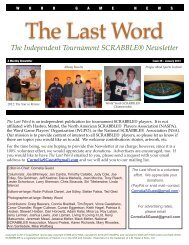SCRABBLE - The Last Word Newsletter
SCRABBLE - The Last Word Newsletter
SCRABBLE - The Last Word Newsletter
You also want an ePaper? Increase the reach of your titles
YUMPU automatically turns print PDFs into web optimized ePapers that Google loves.
T H E W O R D S M I T H“September,” a Boston Globe story informed me one day, “…is often the early bellwether ofhow the fiscal year is shaping up.”Never mind the finances, a grim enough topic these days. <strong>The</strong>re’s one of those words –BELLWETHER. For me, this word has always evoked the image of a tolling bell portending astorm, only I had to remember to drop the “a” from the weather part.<strong>The</strong> Oxford English Dictionary soon sets the record straight.A BELLWETHER is simply the leading sheep in a flock, around whose neck the shepherdhangs a bell. This may be obvious enough if one knows that a WETHER is a gelded malesheep – which anyone who has studied their six-letter words assiduously, with meanings,could tell you. But experience suggests that most <strong>SCRABBLE</strong>® players don’t spend all thatmuch time on six-letter words, and many do not go out of their way to learn meanings.Our family had a very modest flock of sheep while I was growing up, and even a few thatwore bells, but I never made the BELLWETHER connection. In any case, I have to wonderwhat good it did the sheep, as at least one of the bell-bearing beasts was slaughtered by apack of rather uncivil German shepherds - “ding! ding!” in this case meaning their doggiedinner was ready.<strong>The</strong> derivation of WETHER, and its spelling variations, occupies the better part of a page inthe OED, but it will suffice to illustrate my English-and-Anglo-Saxon-centric point if I note thatthe various linguistic references thereon encompass Common Teutonic, Old English, Old LowFranconian, North Frisian, Old Middle German and so forth.Moving to the kitchen, everyone knows what a dishcloth is, even if some young folks seempuzzled as to what to do with such an item. But what’s a DISHCLOUT? And could it be usedto sop up dull old dishwater, or its close cousin, ditchwater?DISHCLOUT is, indeed, a dishcloth by another, older name. CLOUT has very deep roots inOld English and Old Teutonic, meaning, variously, a clod of earth, a cloth, or, as a verb, topatch something with cloth or metal, or to simply club someone, usually on or about the headand shoulders.<strong>The</strong> OED offers several instances of DISHCLOUT in literature, the most amusing being fromthe “Diary and Letters of Madame D’Arblay,” by the English playwright Fanny Burney, in whicha maid laments having failed to properly tidy up the table, and exclaims, with reference to acertain visiting dignitary: “Only think what a slut Mrs. Ord must think me, to put a dish-clout inmy pocket!”Needless to say, slut in that context meant a kitchen maid or drudge, no doubt one inattentiveto the niceties of keeping a clean house, but did not always carry the implications of loosemoral character that have today come to monopolize the word. Indeed, among the otherusages of the word now forever lost to us is the one “in playful use, or without seriousimputation of bad qualities,” as in this line from Samuel Pepys’ famous diary: “21 Feb. Ourlittle girl Susan is a most admirable slut, and pleases us mightily.”24
















